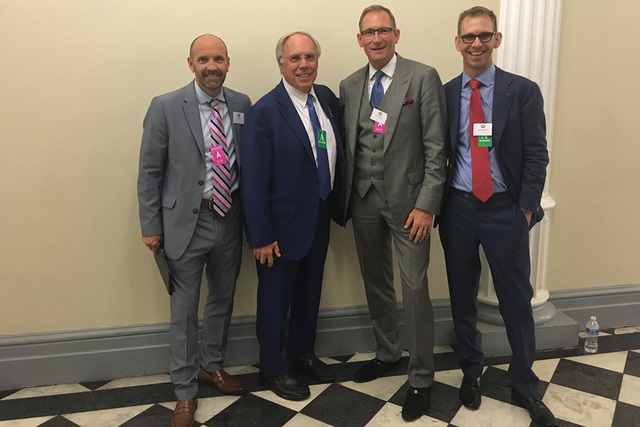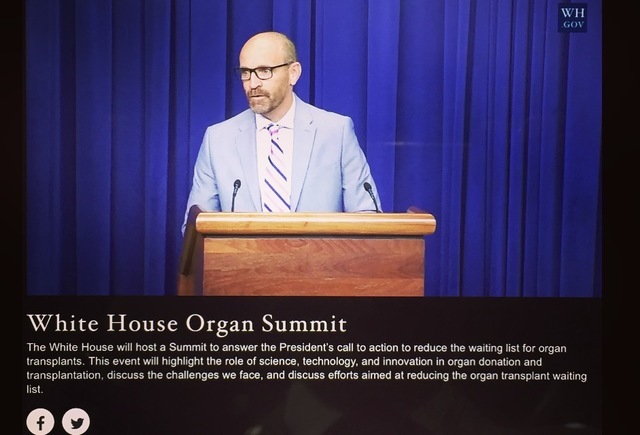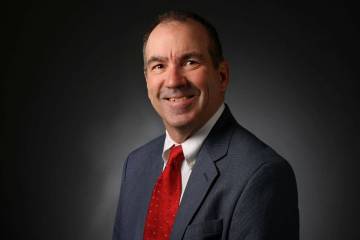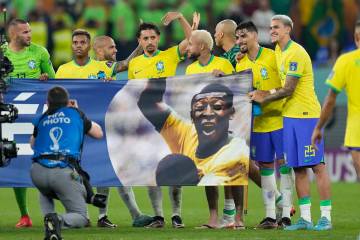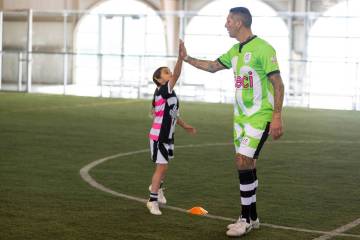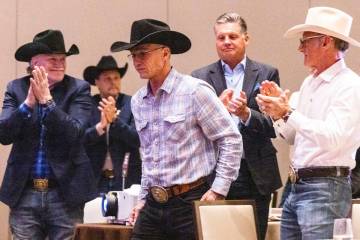Former UNLV soccer star Simon Keith makes organ donation pitch at White House
A couple of weeks ago, former UNLV soccer star Simon Keith was one of five people asked to give a speech about organ donation. The speech was in Washington, D.C. At the White House.
(Or if you are a stickler for semantics, just west of it, at the Eisenhower Executive Office Building.)
He sort of felt like that guy from the Talking Heads song who asks himself how did he get there.
“Never thought a jock from Victoria, B.C., would make it here,” he wrote on his Facebook page. “What a humbling experience.”
Simon Keith, as you may know if you’ve been following this space, received a heart transplant when he was 21 years old. He’s 51 now. That makes him one of the world’s longest surviving heart transplant recipients. That makes him pretty darn special.
The advocacy he is performing as head of his own foundation and chief operating officer of the Nevada Donor Network is pretty darn special, too. That’s what brought him to the White House for the humbling experience.
He spoke June 13 at the White House Organ Summit. One of the other speakers was Kenneth Moritsugu, the retired U.S. Surgeon General — the guy referred to by job title on the little warning on the cigarette package. Other speakers were highbrow professors at Stanford and UCLA. The professor from Stanford, Alvin E. Roth, won the Nobel Memorial Prize in Economic Sciences in 2012. He was lecturing at Harvard then.
I kidded Simon Keith that while he has yet to win a Nobel Prize, he once scored a couple of goals against Cal State Fullerton.
“There’s only five speakers, and I’m sitting to the side of the former surgeon general and the Nobel Prize winner for economics,” he said in implying there were a couple of soccer-related upsets in June, and Iceland beating England might not have been foremost among them.
Asked how it came to pass that he would speak at the White House, Keith said it was a simple process: Somebody from the White House called; they asked if he wanted to speak about organ donation; he said yes.
What other answer could there be?
He was told he would have five minutes to speak, and don’t go over, because there are Secret Service on the grounds.
Five minutes may not seem like a lot of time in which to get one’s message across. But when you consider the surroundings, it’ll make one’s knees knock and tongue twist like Ralph Kramden in “The Honeymooners.”
At least they let you practice and they give you feedback, Keith said.
When it was his turn to talk, the former UNLV star and 1989 first overall draft pick of the Major Indoor Soccer League — not bad for a guy with a transplanted heart — did not break into a cold sweat and stutter “hamana-hamana-hamana” per Ralph Kramden. He gave a five-minute speech that was most eloquent.
The first thing he said was this year was his 30th living with a transplanted heart. A distinguished audience comprised of people wearing dark suits and other business attire applauded. Keith spoke of making an emotional pilgrimage to seek out the family of the young boy who had lost his life, thus providing him with a second chance at one.
“At just 21 years old, I became the ultimate beneficiary of an amazing decision made by a courageous family in the wake of a true tragedy,” he said, calling organ donation the “ultimate gift” one human being can give to another.
He segued into the 30 years since he received the ultimate gift, and all that he has learned about organ donation, and that people still need to be educated about it.
You know how when you go to the Department of Motor Vehicles, and if you think about it, you might check the little box next to where it asks if you want to be an organ donor should the worst thing happen on the highway or the emergency room?
While 95 percent of Americans are said to support organ donation, fewer than half are registered donors. Fewer than half check the little box. That’s why “social declaration” — a recent and somewhat controversial method (privacy concerns) of identifying potential organ donors through social media — can be such a game changer, Keith said.
He said social declaration is a less formal way of identifying potential organ donors, the new millennium way to do it — something that can be used to bridge the gap from the 95 percent who say they support organ donation to the less than half who actually check the box at the DMV.
“That’s why I found myself standing up in front of those people at the White House,” he said.
Simon Keith wore glasses with bold rims, and he did not appear nervous, and he closed his five-minute dissertation by saying the Nevada Donor Network wants people to look at organ donation in another way.
“Why? Because lives depend on it. Mine did.”
The people wearing dark suits applauded again.
Simon Keith probably will never win a Nobel Prize, or warn about the use of tobacco on the cigarette package, or score a goal in the European soccer championships. But he had made it to the White House, and that must have made him feel as if he was making a difference.
Las Vegas Review-Journal sports columnist Ron Kantowski can be reached at rkantowski@reviewjournal.com or 702-383-0352. Follow him on Twitter: @ronkantowski



